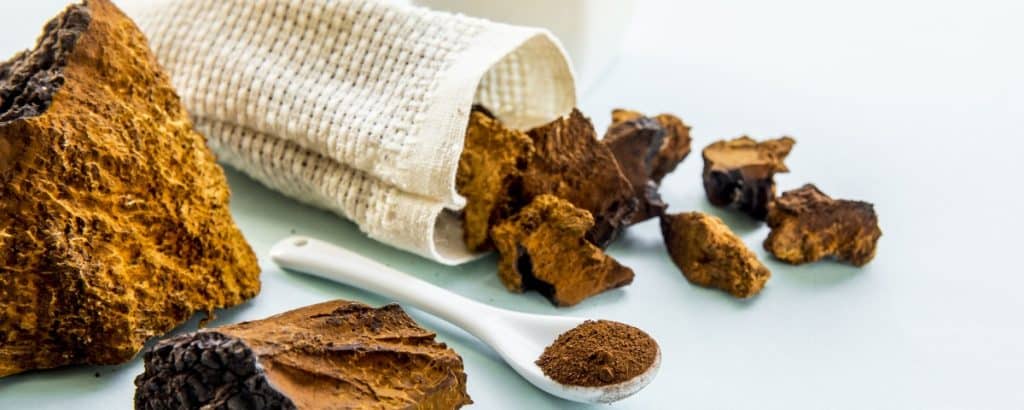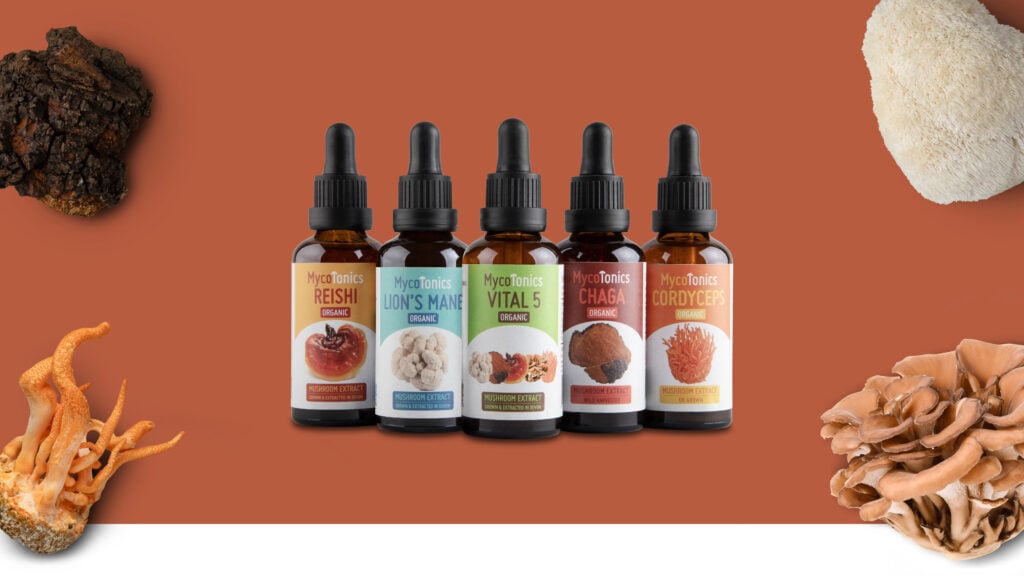Chaga is a strange-looking parasitic fungus, resembling a chunk of burnt charcoal, that’s usually found growing on the side of birch trees in cold climates.
When it comes to medicinal fungi, chaga mushrooms stand out for their antioxidant content and long history of use dating back thousands of years.
Traditional healers in Eastern Europe documented using chaga to treat cancer and other ailments in the 12th century, but modern research into the health benefits of chaga only began in the 1950s.
If you’d like to try chaga as a supplement you can try taking it as an extract. And if you’re in the UK I’d love you to check out our range of extracts called MycoTonics.
Chaga is a functional medicinal mushroom and adaptogen that’s best known for its immune-boosting and cancer-fighting properties, but it has so much more to offer.
From reducing inflammation and protecting the liver to enhancing physical endurance and combating aging, the compounds in chaga can provide remarkable benefits.
Read on to learn about chaga mushroom health benefits, how to include chaga in your diet and the potential side effects of consuming chaga.
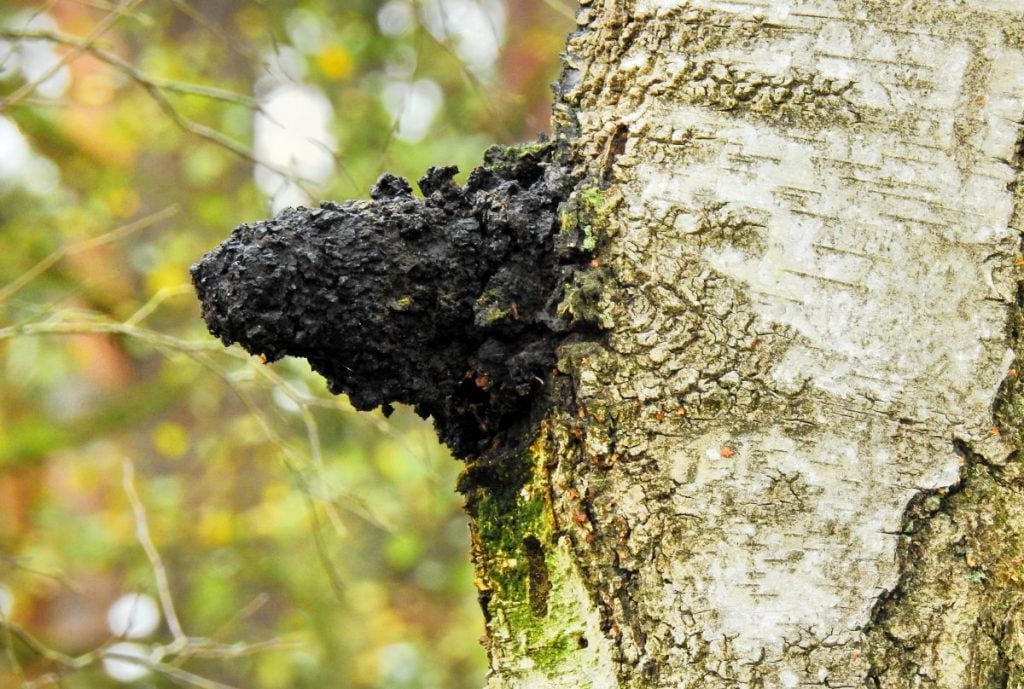
Chaga Mushroom Health Benefits
Chaga mushrooms (Inonotus obliquus) are considered one of the most potent medicinal mushrooms available and contain more than 215 bioactive compounds that provide numerous health benefits, including:
1. Reducing Inflammation
Inflammation is our body’s natural immune response to injuries and invaders like bacteria and viruses and a necessary part of the healing process.
However, long-term inflammation can cause chronic pain and other serious health issues, including arthritis, autoimmune disease and heart disease.
Chaga mushrooms are high in antioxidants and anti-inflammatory compounds, including betulinic acid and ergosterol, that play a role in reducing inflammation.
Several studies examining the anti-inflammatory effects of Chaga in mice found that Chaga extract reduced inflammation by inhibiting the production of pro-inflammatory cytokines.
Cytokines are small protein-based signaling molecules that cells use to communicate with each other, and not all cytokines are bad.
When there’s an injury or infection in the body, cells will send out cytokines that signal the immune system to step in and fix the problem.
Chagas ability to regulate the production of harmful cytokines is important because they can increase the intensity of inflammation and promote ongoing inflammatory responses.
2. Helping to Prevent and Fight Cancer
Chaga mushrooms are rich in antioxidant compounds that animal and test tube studies have shown to have anti-tumor properties but to confirm their effectiveness in humans, more research is needed.
A 2009 in vitro study found that chaga extract inhibited the growth of human colon cancer cells by inducing apoptosis, a process that the body uses to rid itself of damaged cells.
In another study, scientists noted a 60% reduction in tumor size in mice who consumed chaga extract for 3 weeks, suggesting chaga could be used for cancer suppression.
And recently, a 2021 study on the anticancer effects of chaga mushrooms in different types of breast cancer cells, found the compounds in chaga effectively suppressed tumor growth without interfering with conventional drugs.
Although we need more human studies to understand chaga’s anti-cancer effects, traditional healers have used chaga extract as part of cancer treatment programs for thousands of years.

3. Lowering Blood Sugar
Scientists have conducted several animal studies highlighting chaga’s potential to assist in maintaining stable blood sugar levels.
In one study, diabetic mice who were given chaga supplements for 3 weeks showed improved overall health and a 31% decrease in blood sugar levels.
Another study, also using mice, confirmed these findings and showed that chaga has the potential to reduce fasting blood sugar levels and improve insulin resistance.
Several more animal studies support claims that chaga could be a promising functional food for diabetes treatment, but no human studies are currently available.
Balanced blood sugar is crucial for overall well-being and provides several benefits, including:
- More Energy – Balanced blood sugar provides a steady stream of energy, preventing the rollercoaster of sugar spikes and crashes that cause energy slumps.
- Improved focus and mood – Fluctuations in blood sugar can affect mood and concentration. Keeping blood sugar levels steady helps to maintain focus and a positive outlook.
- Better Weight Management – Balanced blood sugar contributes to weight management by curbing excessive hunger and promoting a healthy metabolism.
4. Protecting the Liver
Another benefit of consuming chaga mushrooms is that they may protect the liver from harmful chemicals.
The liver plays a crucial role in our overall health, and it’s the body’s primary detoxifier, breaking down and eliminating toxins from the bloodstream.
It also regulates metabolism and stores essential nutrients like vitamins and minerals, releasing them as needed.
A 2015 study using liver cells from rats found that the antioxidants in chaga extract protected liver tissue from harmful chemicals by combating damage from free radicals.
However, scientists still need to conduct human trials to determine whether chaga will protect the human liver in the same way.
5. Promoting Heart Health
Chaga mushrooms may help reduce the risk of heart disease by maintaining healthy cholesterol levels.
Studies suggest that the bioactive compounds found in Chaga, such as triterpenes and beta-glucans, may play a role in cholesterol management.
A 2009 study using rats highlighted chaga’s potential to reduce low-density lipoprotein (LDL) cholesterol, commonly known as the “bad” cholesterol.
The rats that received chaga extract for 8 weeks showed a significant decrease in LDL cholesterol and increased antioxidant levels.
Elevated LDL cholesterol can contribute to plaque formation in arteries, increasing the risk of heart disease.
Another more recent study found that the triterpenes in chaga mushrooms could help regulate cholesterol synthesis in the liver.
6. Boosting the Immune System
A well-functioning immune system helps the body fight infections and diseases, and studies show that the active compounds in chaga mushrooms may boost the immune system and help it function optimally.
For example, a 2011 study found that chaga polysaccharides provided immunomodulatory effects by promoting the production of beneficial cytokines that enhanced the activity of immune cells.
Another study using mice highlighted chaga extracts’ potent immunomodulatory activity and suggested it could potentially be used as an immune enhancer during chemotherapy.

7. Improving Gut Health and Digestion
Traditional healers have used chaga for its digestive system issues for centuries, and now researchers are confirming chaga’s role in promoting gut health and aiding digestion.
The gut plays a significant role in our overall well-being, so keeping it healthy and balanced is crucial, and studies indicate that chaga may help in several ways, including:
Modulating Gut Microbiota
A 2017 Study using mice explored the prebiotic potential of chaga mushrooms and found that chaga extract helped to regulate gut microbiota composition and increase diversity.
Prebiotics are substances that support the growth of beneficial gut bacteria, and the polysaccharides found in chaga’s dietary fiber qualify as they help nourish these essential microorganisms.
But it’s not only polysaccharides that play a role. Chaga mushrooms also contain other bioactive compounds, including melanins, that promote the growth of beneficial gut bacteria.
Preventing Gastric Ulcers
In a study exploring the gastroprotective effects of chaga mushrooms, the compounds in chaga extract helped protect the stomach wall of rats with ulcers.
Treating Inflammatory Bowel Disease (IBD)
Scientists have conducted several studies exploring the use of chaga mushrooms to aid the treatment of IBD with promising results.
A 2012 study exploring the effects of chaga extract on intestinal inflammation suggests that it might be a beneficial supplement for people with inflammatory bowel disease.
In a recent study also using mice, scientists found that chaga reduced inflammation in the gut by decreasing the production of pro-inflammatory cytokines and increasing beneficial cytokines.
So, adding chaga to your daily routine may contribute to a balanced and flourishing gut microbiome that improves digestion, nutrient absorption and mood regulation.
8. Facilitating a Healthy Skin
Along with all the other health benefits, the antioxidants and polysaccharides in chaga also provide several skin benefits, including:
- Protecting skin from UV damage
- Improving skin elasticity
- Combating oxidative stress
- Helping prevent wrinkles, discoloration and acne
The dark outer layer of Chaga mushrooms contains large quantities of melanin, and many consider chaga one of the world’s best natural sources of melanin.
The polyphenols in melanin have high antioxidant activity, keeping cells healthy and potentially acting as a sunscreen because of their ability to absorb UV radiation.
In a 2019 study, chaga extracts exhibited significant DNA protection and repair activity, highlighting their potential for use in cosmetic products to provide UV protection.
And chaga is not only beneficial for your skin when used externally. Regular consumption of chaga extract is the most common way to access chaga’s impressive skin benefits.
Many of these skin benefits result from the beneficial effects chaga has on gut and liver health, as confirmed by a case study on 50 people exploring the use of chaga extract to treat psoriasis.
This study found that after 9 to 12 weeks, individuals taking chaga extract daily experienced improved gastrointestinal functions, increased vitality and better skin health.
And, over time, ongoing intake of chaga resulted in the disappearance of their psoriasis symptoms.
9. Helping to Fight Viruses
Although best known for their immune-boosting qualities, chaga mushrooms also exhibit remarkable antiviral properties, inhibiting a broad spectrum of viruses.
Numerous studies have explored the antiviral activity of Chaga, and results suggest it has the potential for use in new antiviral drugs.
For example, a 2015 study highlighted chaga’s effectiveness against the human immunodeficiency virus (HIV) type 1. The research suggests that chaga extracts may interfere with the virus’s ability to enter and infect host cells.
In another study using animal kidney cells, researchers found that chaga’s antiviral activity decreased the infective properties of the hepatitis C virus in just 10 minutes.
And recently, scientists explored the possibility of using the antiviral activity of chaga mushrooms to target the novel coronavirus (SARS‐CoV‐2) with promising results.
In this study, the beta glycan, galactomannan and betulinic acid in chaga were the components that played a role in fighting off the virus.
10. Improving Physical Endurance
Studies suggest that the bioactive compounds found in chaga, such as polysaccharides and antioxidants, play a role in supporting overall stamina and physical performance.
A 2015 study found that mice who consumed chaga extract for 14 days were able to swim for a longer time than those not receiving chaga extract.
Results showed that the mice receiving chaga extract had more glycogen in their muscles and liver.
Glycogen is stored glucose that the body uses for energy production, and more stored glycogen means improved endurance as it takes longer to deplete all the reserves.
The mice receiving chaga extract also had decreased lactic acid levels in their bloodstream. During intense exercise, muscles produce high levels of lactic acid that causes muscle fatigue.
The polysaccharides in chaga appear to help the body remove lactic acid quickly, helping to delay or prevent fatigue.

11. Enhancing Brain Function
Chaga is one of the top medicinal mushrooms for brain health, along with lion’s mane and reishi mushrooms.
What does chaga do to your brain?
In a study on mice with chemically-induced cognitive decline, scientists found that regular doses of chaga extract for 7 days significantly improved higher brain functions like learning and memory.
The results indicate that many of chaga’s brain benefits are due to its potent antioxidants that help reduce oxidative stress, but it also increases acetylcholine (ACh) levels.
Acetylcholine (ACh) acts as a neurotransmitter, and increased levels improve cognitive function, influencing learning and memory.
In another study, scientists found that chaga could be protective against Alzheimer’s disease by reducing oxidative stress and enhancing Nrf2 signaling.
Nrf2 is a naturally occurring messenger protein that helps regulate other antioxidant proteins that protect against oxidative damage.
The Nrf2 pathway is one of the key anti-inflammatory pathways in the body and part of an extensive system that protects the body from damage.
12. Reducing Stress and Improving Mood and Sleep
Chaga mushrooms, renowned for their adaptogenic properties, may offer a natural way to alleviate stress, improve mood, and enhance sleep quality.
Adaptogens are functional plants and mushrooms known to assist the body in adapting to physical and mental stressors and restoring balance.
They restore balance by modulating the body’s immune response to these stressors, and when you balance a body’s systems, it benefits physical health and mental wellness.
What does chaga do to your body?
Chaga works to reduce stress and anxiety in several ways, and although several studies have improved our understanding of the role they play, more research is needed.
Current studies suggest that chaga’s bioactive compounds may influence the functioning of stress response pathways, like the anti-inflammatory Nrf2 pathway mentioned above, increasing emotional well-being.
Chaga also helps reduce the impact of stress by modulating the release of cortisol, a primary stress hormone that affects mood and immune function.
A 2021 study on athletes who consumed chaga supplements three weeks before and one week after an intense endurance run confirmed chaga’s ability to improve mood states.
Cortisol levels in the group taking chaga supplements were 30% lower than the control group, and their mood state or feeling of overall well-being was 10% higher.
The numerous antioxidants in chaga also help by reducing oxidative stress that’s often linked to mood disorders, including depression and anxiety.
A good night’s sleep is also vital for mental health, and the melanin in chaga mushrooms may help improve sleep by keeping the pineal gland healthy and encouraging melatonin production.
Melatonin is a hormone produced in the brain that regulates the body’s circadian rhythms and helps improve sleep.
13. Combating Aging
The fabulous compounds in chaga mushrooms that provide all the benefits listed above may also help to promote longevity and maintain youthful vitality.
Chagas ability to combat oxidative stress is one of the main ways it slows aging.
Chaga is high in antioxidants, including polyphenols and melanin, which help to neutralize free radicals, the unstable molecules linked to aging and cellular damage.
A 2011 study exploring the protective effects of chaga found that chaga may help to protect the skin from sun damage and prevent the aging process by reducing the effect of oxidative stress.
Another study exploring chaga’s potential for protecting against oxidative damage to human DNA highlighted chaga’s ability to provide cellular protection against DNA damage.
But reducing oxidative stress and protecting DNA are not the only ways chaga combats aging and promotes longevity. It also helps to maintain health and vitality by:
- Reducing inflammation
- Supporting the immune system
- Fighting Cancer
- Maintaining a healthy gut
- Improving sleep quality
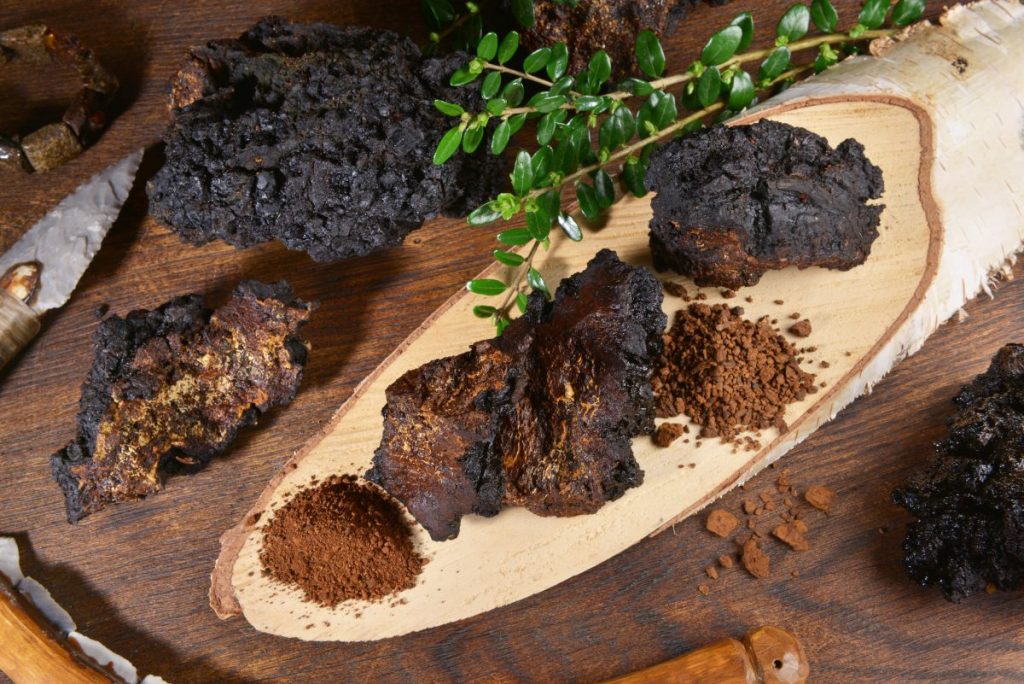
Chaga Mushroom Nutritional Breakdown
Chaga mushrooms contain more than 215 active compounds, including several potent antioxidants and essential vitamins and minerals.
Some of the most important compounds in chaga, responsible for many of its health benefits, are polysaccharides, beta-glucans, betulinic acid, triterpenes, sterols and melanin.
Chaga is also a good source of B complex vitamins, including vitamin B1 (Thiamine), B2 (Riboflavin), B3 (Niacin), and vitamin D2 (Ergosterol).
Along with vitamins, chaga also contains trace minerals like copper, selenium, zinc, manganese and iron and several essential minerals, including potassium, magnesium, calcium, chloride, sodium and phosphorus.
Essential minerals are minerals that the body can’t produce, so you need to get them from food.
Notable minerals in 3.5 oz (100g) of chaga are:
| Potassium | 2099 mg |
| Iron | 1089 mg |
| Calcium | 687 mg |
| Zinc | 499 mg |
| Sodium | 189 mg |
| Magnesium | 185 mg |
| Manganese | 175 mg |
| Selenium | 82 mg |
A 100g serving of chaga mushrooms also contains 2.31g of high-quality protein with 15 different amino acids, and, like most other mushrooms, chaga is low in calories and fat.

How to Include Chaga in Your Diet
Chaga is too woody to eat, so it’s commonly consumed as a tea because brewing chaga in hot water makes it easier to digest and releases more beneficial compounds.
You can make chaga tea using powdered chaga or chunks of dried chaga, and if tea is not your thing, try adding powdered chaga to coffee, smoothies, soups, stews and other recipes.
Wondering about the chaga mushroom tea taste? You may be pleasantly surprised as chaga has a mild, earthy flavor with subtle, sweet, vanilla-like undertones.
Chaga mushroom supplements are another convenient way to include chaga in your diet, and you’ll find chaga mushroom tinctures, capsules, tablets and mushroom powder online and in many health food stores.
You’ll also often find supplements that combine chaga with other medicinal mushrooms to provide a broader range of benefits.
There are often so many supplements to choose from that it can be confusing. Here are some things to consider that will help you select the best chaga supplements:
- Look for chaga that’s certified organic, as chaga, like most mushrooms, absorbs pollutants from the environment.
- Look for wild-harvested chaga as some of chaga’s beneficial compounds, like betulin and betulinic acid, come from the host birch tree, and in lab-grown chaga, these compounds are missing.
- If you’re buying a mixed supplement, check the amount of chaga mushroom in the supplement and ensure it contains enough chaga extract to provide the health benefits you’re after.
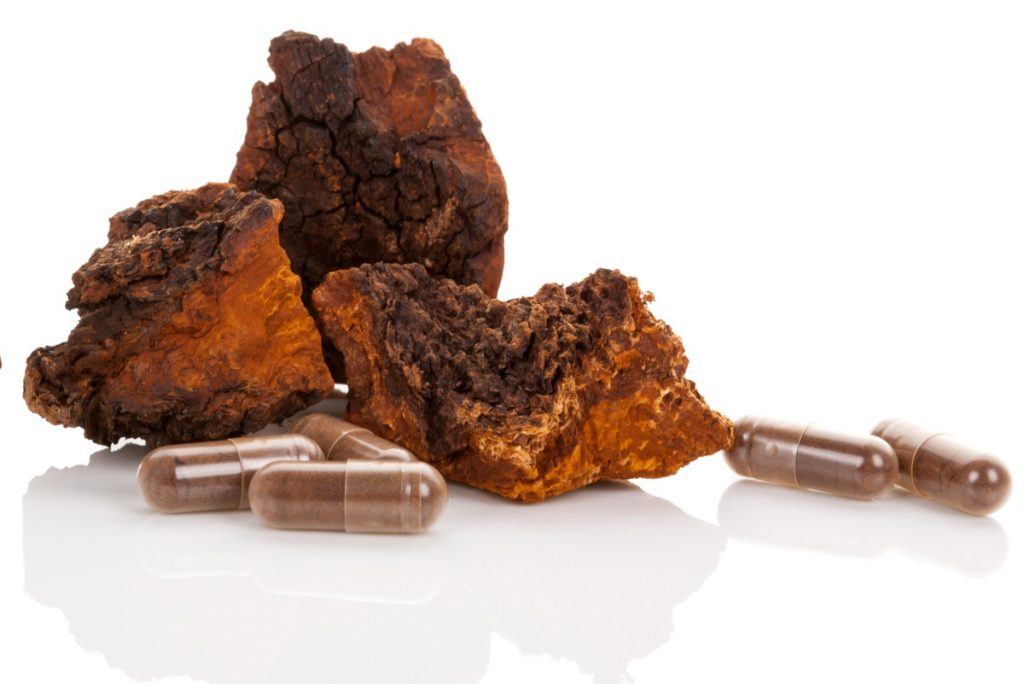
Is it Safe to Take Chaga Every Day?
It is usually safe to take chaga daily, but moderation is key. Research on chaga mushroom dosage is still evolving, and the appropriate dose will vary from person to person.
Several factors affect how much chaga you should take daily, including your age and health, the quality of the chaga and the type of supplement you choose.
Generally, people consider a dose of 500 to 1,500 milligrams per day safe and effective, and adults can even go as high as 2000mg (2g), which is about a teaspoon of chaga powder a day.
More than 2000mg a day is not recommended as this may provide too many oxalates that increase the chances of kidney problems.
As there are no set recommendations on chaga mushroom dosages, it’s best to buy your chaga from a reputable source and follow the dosage guidelines on the product.
However, if you’re new to chaga, we suggest starting with a lower dose of 250-500 mg daily and observing how your body responds before working your way up to the recommended dosage.

Does Chaga Mushroom Have Negative Side Effects?
Chaga mushrooms offer numerous health benefits, and traditional healers have used them for centuries to treat various ailments without reporting significant side effects.
But, like other supplements, they may produce unexpected side effects, especially when combined with certain medications, and it’s important to be aware of potential risks, including:
Allergic Reactions
Chaga is well tolerated by most people, but some people may experience allergic reactions resulting in symptoms such as itching, skin rash or swelling.
If you’re trying chaga for the first time, start with a small amount and check for any adverse reactions.
Digestive Discomfort
Overconsumption of chaga can lead to digestive discomfort or an upset stomach. Chaga is rich in minerals and fiber that may have laxative-like effects in large doses.
If you experience these symptoms, try adjusting the dosage or consulting a healthcare professional.
Blood Clotting Concerns
Studies suggest chaga mushrooms might have mild blood-thinning properties.
If you are on blood-thinning medications, it’s advisable to consult your doctor before adding chaga to your routine to avoid potential interactions.
Interaction With Medications
Chaga mushrooms may interact with medications, especially those for diabetes or high blood pressure. If you are on any medication, it’s best to consult your doctor before you add chaga to your diet.
Increased Risk of Kidney Stones
Chaga mushrooms are high in oxalates, and in high doses, they may increase the risk of kidney stones.
People with kidney disease or a prior history of kidney stones should be cautious and consult a doctor before taking chaga.
Finally, although most people enjoy the benefits of chaga without any side effects, there’s very little research available on the safety of using chaga supplements during pregnancy.
So, if you’re pregnant or breastfeeding, it’s best to err on the side of caution and consult your doctor before making changes to your diet.
Final Thoughts
Although researchers have conducted numerous chaga studies in vitro and using animals, there are very few studies monitoring the effects of chaga on the human body.
However, humans have been using the potent medicinal properties of chaga to treat illness and disease for centuries with great success.
Resulting in nicknames like ‘nature’s gold,’ ‘diamond of the forest,’ ‘king of the mushrooms,’ and ‘the gift of nature’ among others.
Including chaga in your daily routine can be safe and exceptionally beneficial, but it’s best to start slowly and monitor your body’s response.
To learn more about other edible and medicinal mushrooms, visit our Mushroom Education Hub.
